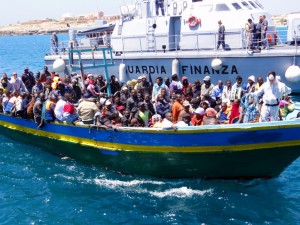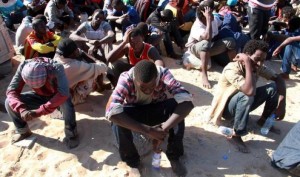Sometimes news pass unobserved. On Monday, 20th of April, in Catania, the Linguistic aperitif moved from its’ usual location (a pub near the city harbour) and not for a stupid reason. The harbour had to be the scene of one of the saddest events of the last months. More than 900 people – including 200 women and up to 50 children – tragically died after a boat overturned in one of the worst maritime disasters since the end of World War II.
 Only 28 passengers were rescued after their overcrowded fishing boat tipped over at night on its way from Libya to Italy. One of the survivors, a man from Bangladesh, said that there were 950 migrants on board, about 300 migrants were trapped in the ships’ hold when it sank.
Only 28 passengers were rescued after their overcrowded fishing boat tipped over at night on its way from Libya to Italy. One of the survivors, a man from Bangladesh, said that there were 950 migrants on board, about 300 migrants were trapped in the ships’ hold when it sank.
Rescuers recovered 24 bodies from the sea, soon after the disaster, which took place outside of the Libyan waters, south of the southern Italian island of Lampedusa, shortly after midnight on the 19th of April.
The small numbers of survivors make more sense if hundreds of people were locked in the hold because with so much weight down below, surely the boat would have sunk. This tragedy comes just days after another shipwreck in the area claimed 400 lives. This could possibly be the biggest tragedy to have ever taken place in the Mediterranean Sea.
Maybe Italy and Malta need more support in dealing with the migrant crisis?
“Europe can do more and Europe must do more” said Martin Schulz, president of the European Parliament- can that be true? “Where is Europe?” is what I hear walking down the streets and talking with people here in Catania: the mistrust in the European Institutions is increasing more and more. We are always talking about “Spreading Europtimism”, but how, in reality, may we convince people to be faithful after such a disaster?
Maybe all is increased by the media, that is creating a gap of information (or maybe, “misinformation”) because the news they pass is not all or not complete enough.
In conlcusion, I think that it is very difficult to feel the “European feelings” when, from the main stakeholders in summits, some decisions are never taken together.
Written by Elisa Tabbì, AEGEE-Catania

